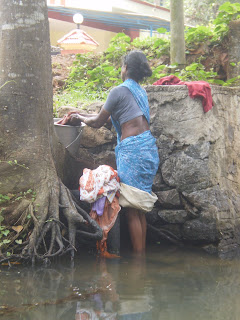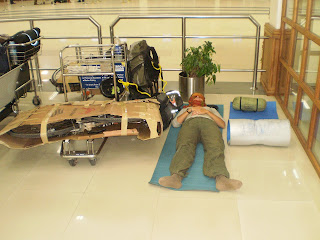 |
| In Rathambore we didn't see the tigers, but their food |
Hallo dear readers, our first stage in India is almost over! We travelled in Rajasthan the last two and a half weeks, cycling from Jaipur to Rathambore national park and over Bundi and Chithorgarh to Udaipur. Today we will leave Rajasthan by train towards south, after having managed the adventure of buying a train ticket at the station only 2 days in advance... - but from the beginning:
It took a couple of meters to remember ourselves that in India they are driving on the left side on the road. Thank you British Raj! But is wasn't all that bad. We were lucky again and we arrived on a Sunday early morning. So the streets were relatively calm for Indian standards. But in general the traffic is much much better than we expected it to be - or are we just used to Iranian standards?!? We were quite relieved and rather
 |
| Normal street landscape |
amused by all the things we could see on Indian streets. There are cars of course (but few), motorbikes of all kinds (Matteo was fascinated by the Royal Enfields), Tuk-Tuks, Piaggio Ape, Cycle Rickshaws, but also carriers pulled by horses, oxes and even camels! There are cows everywhere, standing in the middle of the traffic, not impressed by the people who try to drive by. The pigs that feed themselves of all the rubbish left on every street corner are also quite calm. Only the rats seemed to have some problems crossing the steerts. On every corner we see a temple, some with monkeys....to make it short: a lot of impressions....
India is crazy, wild, different - so far we love it! (But you have to accept a couple of things though...)
All the different people, with different languages, faiths, clothing and casts can be very confusing. Especially if you want some information. e.g. "Do you/Hindus eat meat?" the answer can be "Yes" or "No! Never!!" depending which cast you ask.
 |
| Will Matteo bring her back to the real world? | |
|
|
The price system is at least as confusing. For the same (really the SAME) sari on merchant wanted 2200Rs (1Euro = 59Rs), another one a few meters away charged us 200Rs. Where is the logic?! Well, maybe there isn't any. It is just a matter how much you are willing to pay. Some merchants do charge too much, of course, but it can be the complete opposite as well. In a shop we wanted to buy a string which was 5Rs, while chatting Mascha accepted a tea from a street seller who was payed by the shop keeper (5RS). The same shop keeper refused to accept the payment of 10Rs afterward, and accepted only the 5RS for the string (which means zero profit for him ->crazy India). A similar story happened one evening, the sun was setting down and we were in a hurry to find a camp site, but had to get some water before. On a street stand we refilled our bottles with water from some big clay jars. We did not want to take the water for free, so we tried to buy some bread as well, to make a little business for the family running the stand. But instead they prepared a whole dish with bread and daal - and did not accept ANY money for all that afterwards!
In any case, in India everything is really so heterodox and so heterogeneous that you cannot estimate the average attitude of the people without accepting a huge standard deviation, I think much bigger than in every other country we have ever been. So, you always have to deal with a situation as if it would be almost your first time. To make an example, in Iran we had the impression that everyone who started to talk to us on the street was friendly and wanted to help us. And it was really like that. In India the same may also happen, but you never know, and behind a big smile (here everyone is smiling) you can either find a real friend ... or someone who wants a commission .... or someone who just wants sell you something..... or someone who is just smiling because he is happy ... or someone who wants to cheat you and so on. It is part of the game, and it is part of the fun here.
 |
| having a tea |
From the cyclist point of view, we travel on all kind of roads, from dirt traks to highways. We enjoy pretty much the kilometers we do in the country side, which is at the moment completely green of crops (mostly wheat and some opium). The work in the agriculture is still to the biggest extent done per hand, and with the exception of chemical fertilizers and pesticides to protect the crops (which seem to work really well), I think it is pretty much the same as it was in Europe 100 years ago. We choose normally small roads trough the villages and we have the impression that we cannot do 100 meters without seeing at least one person. People are everywhere, and we are really a huge attraction in all villages (even more staring than in towns, if that is possible). If we stop to repair a puncture also 20 people just stop to watch at us, if we drink a tea suddenly the shop gets crowded and so on. Once, we drank a tea at a road stand and one boy brought Matteo a message on a small peace of paper from the teacher of the local school. He wanted to meet us and speak with us. He said we were the first tourists, who have ever been in that village, and for many villagers the first European or simply white people they had ever seen in their life. We had a nice conversation and we got invited from an other teacher to his house. It turned out that this second teacher was from the cast of the Rajputs, the highest class in all Rajastan, of the few casts who are allowed to eat meat. He brought us to see his fields, approximately not more than 5 hectars (about 10 rugby fields) cultivated with papaya and wheat, some chicken and four female buffalos. Three families (about 15 people) were working the fields and living there in small open huts. He could pay his workers and even make a profit just with 5 hectars of grain! It is absolutely incredible for our European standards, unless you imagine how low the work of a man is payed in India. Anyway, all the people were happy and in good health. In our honour our host wanted to offer us meat, therefore we had to catch one of his beautiful rooster. It run so fast and it was so smart that it was almost impossible to catch it. Matteo tried to say " It deserves to live, we eat vegetarian again, actually it was not that bad to eat vegetarian in the last two weeks!". No way, our host wanted to offer us the meat, maybe to show us the privilege of his cast? The farmer and all the kids could get the rooster after many, many difficulties and one really dirty trick (basically breaking one of its legs with a long stick), the farmer killed the roaster and after a couple of minutes it was ready to be slaughtered. Once arrived in his house in the village, our host refused to do it, so Matteo had to do the job. We spend pretty much all the afternoon at his home. He explained Matteo that according to the Hindu culture the meat of different animals has a different effect on the human body. The rooster is supposed to have prodigious effects on the male sexual activity. Since the host deserved the best parts for himself and just some bones for Matteo, we understood why he wanted to kill that rooster...
 |
| Mascha in tutta la sua bellezza |
 |
| Matteo training for the next Oktoberfest |
P.S.
If Mascha wasn't a cycle traveler, she would be a photographer and would only travel around
India taking pictures of old men (they are too cool and cute here!)
If Matteo wasn't a cycle traveler, he would make deals selling traps for flies he just imagined, sewage water
treatment systems and so on.











































